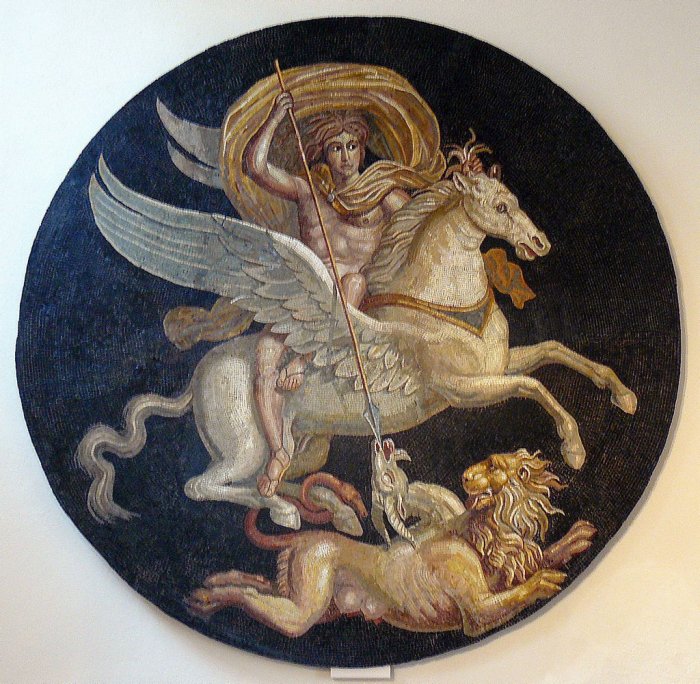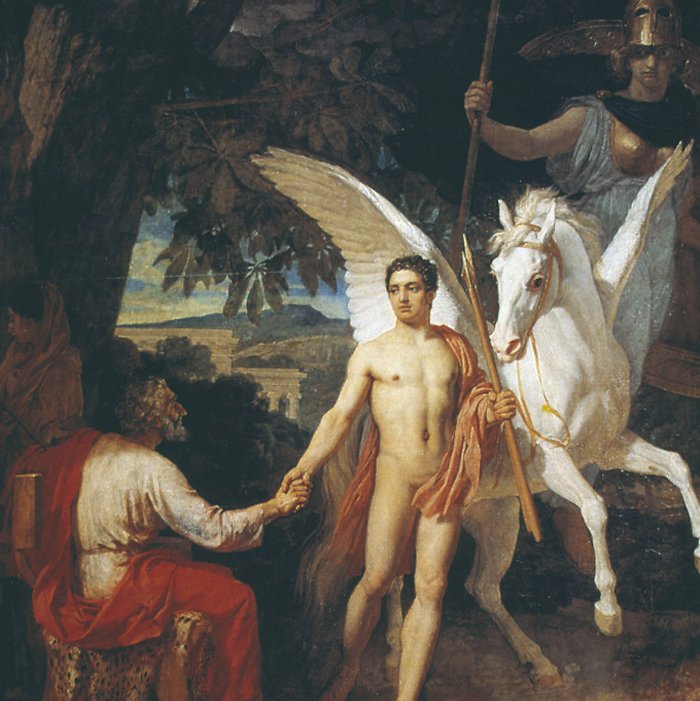Bellerophon: Great Hero Of Homer’s Iliad Who Was Punished By Gods For His Pride And Arrogance
Angela Sutherland - AncientPages.com - In Greek mythology, Bellerophon was the son of the mortal Eurynome (Eurymede) and Glaucus, the son of Sisyphus and King of Corinth. Still, to many of us, he is, first of all, known as the hero of Homer's Iliad.
According to legend, Bellerophon was the mythical founder of Termessos.
Bellerophon was beautiful and handsome as a god and equal to immortal beings in courage.
Mounted on Pegasus, Bellerophon was slaying the Chimera. Central medallion restored from a Roman mosaic of more than 100 m2 discovered in 1830 in Autun (Saône-et-Loire, France. ) Image credit: Félix Potuit - Public domain
So what did happen that he ended his life in misery and blindness?
One tragic incident of his early life happened when Bellerophon - playing with his father's bow - accidentally killed his brother (in another version, the Corinthian citizen), for which he was exiled from the court. Feeling hostility from the citizens of Corinth, he took refuge at Argolis, where he was warmly greeted and greatly honored by the king of Tiryns, Proetus.
The king's divine wife, Anteia (Stheneboea), fell in love with Bellerophon, but he did not want her love. As he rejected her, Anteia wanted revenge for his insult. Now, only her hatred fueled her wrongdoings. She went to her husband, saying:
"Oh, king! Bellerophon insults you heavily. You must kill him. He haunts me, your wife, with his love. That's how he thanked you for your hospitality!"
But what she said to her husband was a lie. No less, this lie could hold.
Yóbates, Bellerophon, Pegasus, and Athena are represented in a painting from 1829, the work of Aleksander Andréyevich Ivan. Image credit: Aleksandr Ivanov - Public domain
The king was furious and undoubtedly disappointed, but he could not mistreat Bellerophon because he was his honored guest. Being afraid of Zeus' anger for disrespectful behavior toward a guest, Proetus had to find another solution.
Finally, he decided to send him a letter to Anteia's father, Iobatus, the king of Lycia.
In the secret letter, written on the double-folded and sealed tablet, Proetus explained to Iobates how seriously Bellerophon had insulted him and asked him to take revenge on him for the insult.
"Pray to remove the bearer from this world: he attempted to violate my wife, your daughter."
Like Proetus, also, Iobates feared anger from the gods for killing a guest. Instead, he sent Bellerophon on a hazardous mission that he considered impossible. The hero's task was to kill Chimera, a monster with a goat's body, a lion's head, and a serpent's tail.
The creature spewed fire from three mouths and terrorized the nearby countryside of Caria for a long time.
Bellerophon encountered the famous Corinthian seer Polyeidos, who advised him about his dangerous battle with the creature on his way to the fight. Bellerophon was a brave young man, but to kill Chimera, he had to own the winged horse Pegasus, an extraordinary divine creature that flew out of the body of the gorgon Medusa killed by Perseus.
He knew where to find this wonderful horse but catching him was not easy. As soon as he approached the winged horse, the divine animal was carried away with the fastest wind speed behind the clouds.
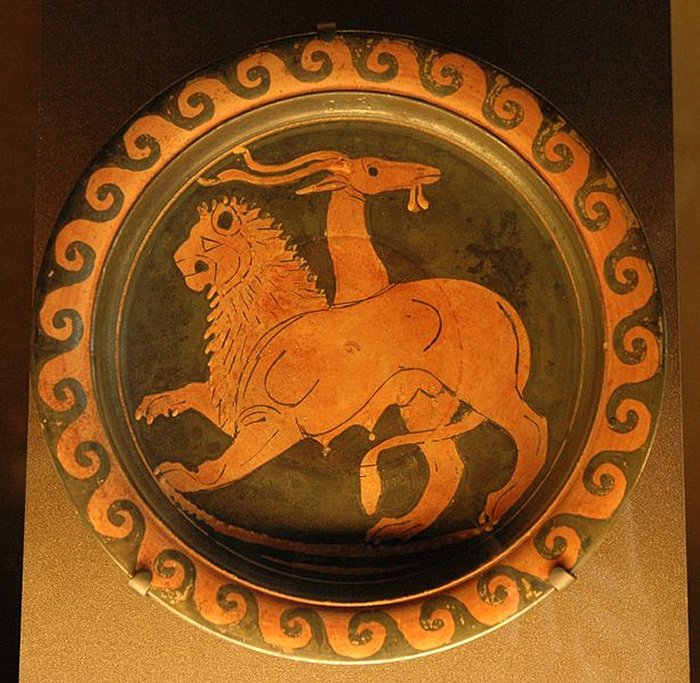 Chimera. Image credit: Jastrow (2006) - Public Domain
Chimera. Image credit: Jastrow (2006) - Public Domain
Finally, Bellerophon managed to tame Pegasus and, flying on him, approached the mountains of Lycia, where the monstrous Chimera had its dwelling. Chimera sensed Bellerophon's approach and tried to hide somewhere, but there was no place to hide. Bellerophon followed her everywhere on his winged Pegasus. Chimera could not hide anymore from the hero's small but deadly arrows.
The hero won the battle with Chimera, engaged himself in a fight with the Amazons, and again was also victorious, killing ambushing assassins he met on his way. King Jobates was impressed and gave Bellerophon his daughter Philonoe and half of his kingdom as a dowry. It seemed the pair was happy with their three children. They lived in Lycia, surrounded by glory and respected by the people.
But were they happy? Or, more precisely, was Bellerophon happy?
Now, Bellerophon was famous and very proud of his almost impossible successes. Pegasus's winged divine horse had an honorable place in Greek mythology and was greatly important for the hero, Bellerophon.
Pegasus symbolizes glory, creativity, and inspiration. Bellerophon needed these virtues and got them all. He also possessed qualities such as courage and strength. He was famous, highly honored, and wealthy. However, pride overwhelmed him as soon as he received fame and glory for his extraordinary deeds. Unfortunately, he became arrogant and too proud. With these negative human values, he lost the favor of the gods.
He imagined himself equal to the gods and tried to fly to Olympus on the divine Pegasus to see the gods. Zeus sent a gadfly to sting Pegasus, causing Bellerophon to fall back to Earth. The gods could not tolerate this behavior and punished Bellerophon for his arrogance.
The hero never reached Olympus, but Pegasus's marvelous horse continued up to Olympus and has not been seen since.
Bellerophon did not die but was seriously wounded. He became a blind cripple, forgotten and abandoned by all until death.
Written by – A. Sutherland - AncientPages.com Senior Staff Writer
Updated on October 18, 2022
Copyright © AncientPages.com All rights reserved. This material may not be published, broadcast, rewritten or redistributed in whole or part without the express written permission of AncientPages.com
Expand for referencesBulfinch T. Bulfinch's Mythology
Walsh, N. Greek Mythology
More From Ancient Pages
-
 New Light On Foodways In The First Cities In Mesopotamia
Archaeology | Nov 21, 2022
New Light On Foodways In The First Cities In Mesopotamia
Archaeology | Nov 21, 2022 -
 Discovery Of Stone Age Textiles Sheds New Light On The History Of Clothes Making
Archaeology | Nov 9, 2021
Discovery Of Stone Age Textiles Sheds New Light On The History Of Clothes Making
Archaeology | Nov 9, 2021 -
 Ancient Ruins Of Nero’s Theater Discovered Under Garden Near Vatican
Archaeology | Jul 27, 2023
Ancient Ruins Of Nero’s Theater Discovered Under Garden Near Vatican
Archaeology | Jul 27, 2023 -
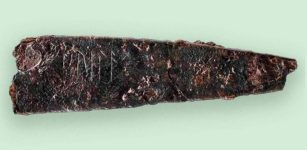 2,000-Year-Old Knife With Denmark’s Oldest Runes Found On Funen
Artifacts | Jan 22, 2024
2,000-Year-Old Knife With Denmark’s Oldest Runes Found On Funen
Artifacts | Jan 22, 2024 -
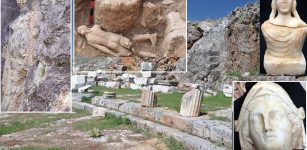 Sculptures Of Kybele, Athena, Hekate, Apollo Unearthed At Hellenistic Site Of Pisidia Antiocheia, Turkey
Archaeology | Oct 15, 2017
Sculptures Of Kybele, Athena, Hekate, Apollo Unearthed At Hellenistic Site Of Pisidia Antiocheia, Turkey
Archaeology | Oct 15, 2017 -
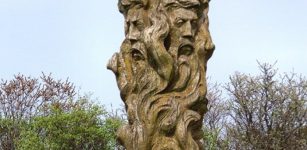 Svantevit – Four-Headed War God Of The Slavic Peoples Of Central Europe
Featured Stories | Sep 13, 2015
Svantevit – Four-Headed War God Of The Slavic Peoples Of Central Europe
Featured Stories | Sep 13, 2015 -
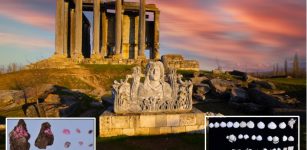 Roman Cosmetics Shop Discovered In The Ancient City Of Aizanoi, Turkey
Archaeology | Sep 29, 2023
Roman Cosmetics Shop Discovered In The Ancient City Of Aizanoi, Turkey
Archaeology | Sep 29, 2023 -
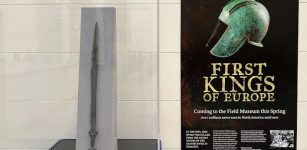 Surprising Discovery – Replica In The Field Museum Is A 3,000-Year-Old Sword
Artifacts | Jan 18, 2023
Surprising Discovery – Replica In The Field Museum Is A 3,000-Year-Old Sword
Artifacts | Jan 18, 2023 -
 World’s Largest Complex Of Borobudur – Spectacular Buddhist Masterpiece
Civilizations | May 3, 2016
World’s Largest Complex Of Borobudur – Spectacular Buddhist Masterpiece
Civilizations | May 3, 2016 -
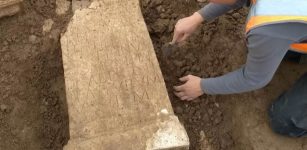 Amazing Discovery Of Ancient Roman Temple In The Netherlands Hailed As An Extraordinary Archaeological Find
Archaeology | Jun 20, 2022
Amazing Discovery Of Ancient Roman Temple In The Netherlands Hailed As An Extraordinary Archaeological Find
Archaeology | Jun 20, 2022 -
 Rock-Hewn Ancient Churches Of Lalibela
Civilizations | Aug 22, 2018
Rock-Hewn Ancient Churches Of Lalibela
Civilizations | Aug 22, 2018 -
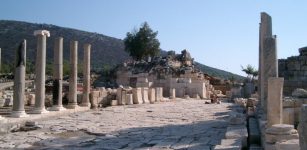 Reconstruction Of Five-Story Patara Lighthouse Built By Roman Emperor Nero – Begins
Archaeology | May 30, 2019
Reconstruction Of Five-Story Patara Lighthouse Built By Roman Emperor Nero – Begins
Archaeology | May 30, 2019 -
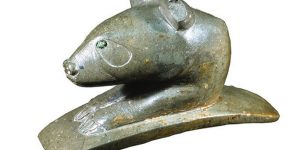 Use Of Tobacco Pipes By Hopewell People Tells A New Story
Archaeology | Jun 28, 2021
Use Of Tobacco Pipes By Hopewell People Tells A New Story
Archaeology | Jun 28, 2021 -
 An Ancient Goldsmith’s Unexplained Encounters With The Unknown
Ancient Mysteries | Apr 16, 2019
An Ancient Goldsmith’s Unexplained Encounters With The Unknown
Ancient Mysteries | Apr 16, 2019 -
 Mythical Place Where Gorgon Medusa Dwelled And Was Killed May Have Been Found By Archaeologists
Featured Stories | Sep 15, 2024
Mythical Place Where Gorgon Medusa Dwelled And Was Killed May Have Been Found By Archaeologists
Featured Stories | Sep 15, 2024 -
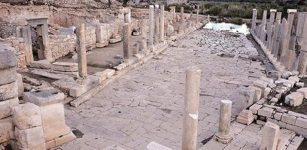 Patara: One Of The Six Big Cities Of Lycian League Is Celebrated In 2020
Archaeology | Jan 15, 2020
Patara: One Of The Six Big Cities Of Lycian League Is Celebrated In 2020
Archaeology | Jan 15, 2020 -
 Surprising Ancient Signs Found On The Ceiling Of An Egyptian Temple In Saqqara Could Rewrite History
Featured Stories | Oct 29, 2024
Surprising Ancient Signs Found On The Ceiling Of An Egyptian Temple In Saqqara Could Rewrite History
Featured Stories | Oct 29, 2024 -
 The Tuli Mummy: Botswana’s Only Ancient Mummified Human Body Discovered So Far
Ancient History Facts | Oct 14, 2016
The Tuli Mummy: Botswana’s Only Ancient Mummified Human Body Discovered So Far
Ancient History Facts | Oct 14, 2016 -
 Mysterious Tunnel Found Under Saxon Palace Ruins In Warsaw, Poland
Archaeology | Sep 14, 2023
Mysterious Tunnel Found Under Saxon Palace Ruins In Warsaw, Poland
Archaeology | Sep 14, 2023 -
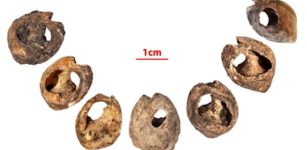 142,000-Year-Old Shell Beads Found In A Cave Are The Oldest Known Evidence Of Human Communication
Archaeology | Oct 16, 2021
142,000-Year-Old Shell Beads Found In A Cave Are The Oldest Known Evidence Of Human Communication
Archaeology | Oct 16, 2021

